Your cart is currently empty!
5 Potty Training Tips for the Frustrated Mama
This post has been updated with an additional potty training tip (tip #2) that includes recommendations for a couple of useful tools for promoting pottying independence.
I wrote a post on how to prepare for potty training several months ago. But I wanted to do an update on my own full experience with some potty training tips to encourage you mamas who are frustrated with where you are at on your potty training journey.
Potty training is not a one-potty-seat-fits-all kind of activity. There are so many different ways this milestone could go for your child. And honestly, it probably won’t be the easiest, breeziest transition for you, Mama.
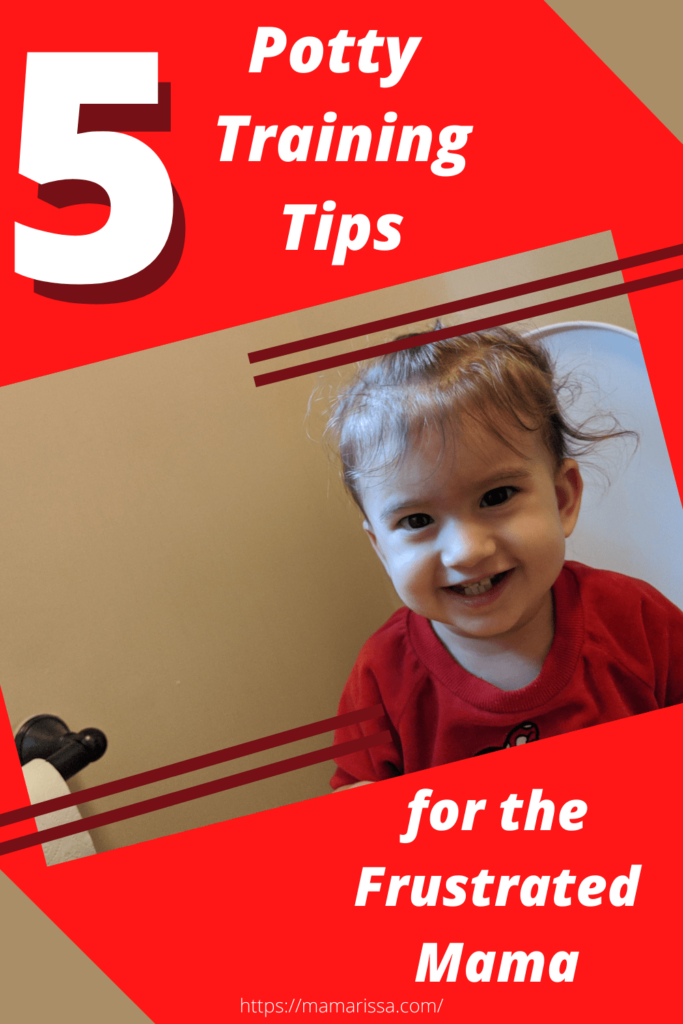
But then, if you’re reading this, you probably already know that.
In this post, I will share my unexpected potty training experience with you and give you some potty training tips I’ve learned along the way, from one mama to another.
Hey Mama, if you find my blog posts helpful, would you help support this blog by making purchases through product links on this page? It will not cost you any extra but the commissions I receive as an Amazon and brand affiliate help to cover the costs of operating this blog so that I can keep it running ad-free. Thank you so much for your support. You are literally the reason this blog was started and the fuel that motivates me to keep it going!
My Potty Training Tips
1. Accept Progress in Stages
Of all my potty training tips, this is the one that was hardest for me to accept, especially because some stages took way longer than I expected with my daughter.
So here’s how my potty training experience went down. We began the process of potty training fairly suddenly but also flexibly when my normally poop-oblivious 19-month-old began to ask for her poopy diaper to be changed immediately after dirtying herself.
Get my FREE guide to getting started with potty training by entering your email at the bottom of the page!
At first, I kept her in diapers and just began sitting her on the potty a few times a day and encouraging her to pee, rewarding her when she actually did. After a few days, I got more intentional and began taking her to the potty every hour or so.
It only took her a couple days of this before she was peeing every time I took her to the potty. By the time we were a week in, I had her in panties during the day so she could have a few accidents and begin to realize why we need to go potty.
Since she seemed to catch on to the idea of going potty so quickly, I thought we were good to go and this was just way too easy!
She continued to progress during that first month to the point that she would poop in the potty and occasionally tell me when she needed to go potty, although it was often after she had peed herself.
And then her progress froze, stuck in the stage of knowing how to go potty but only if I initiated taking her. She remained this way for months and it was frustrating to have her so close but not quite there for what felt like a long time.
For the most part, I remained relaxed about it and we continued on in this semi-potty trained stage with me continuously reminding her to tell me when she needed to go potty and rewarding her the rare times that she did.
A few months ago, she got to the point that she would pretty much always tell me she needed to go potty if she needed to poop. Yet, she would still pee her pants, walk around and continue playing without ever telling me she had peed.
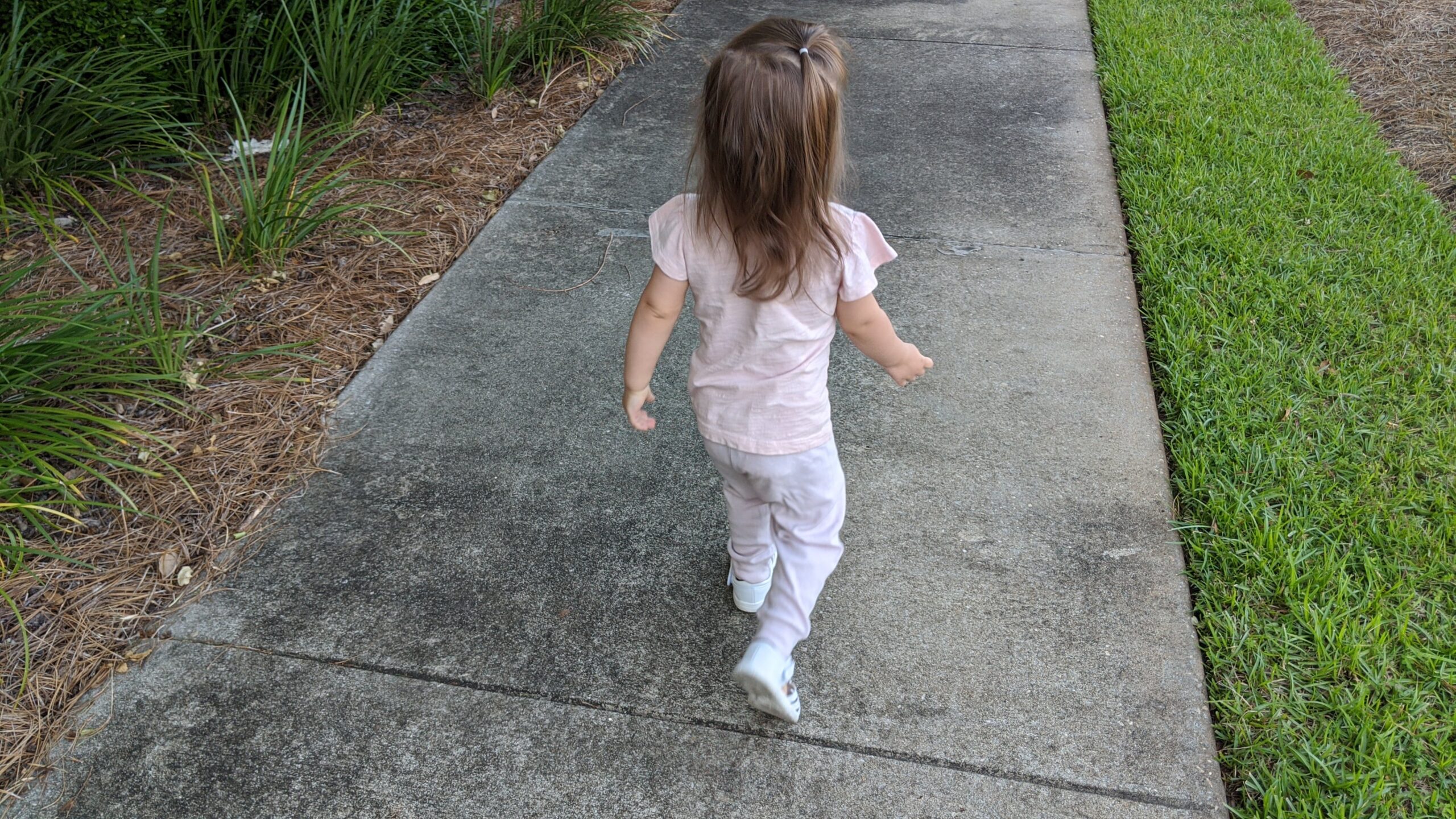
Apparently pee-saturated pants are a great natural air-conditioner.
And THEN, finally, at long last, my potty training joy came to completion just a few days ago (hopefully I’m not jinxing it!). My daughter is now telling me every time she needs to go potty and I feel I can legitimately call her potty trained.
Of course, she still wears diapers for sleep. I am also putting them on her whenever we go out for now because she does pee her pants a little sometimes before she tells me she needs to go potty. But that hardly matters to me in light of her great accomplishment.
All of that is to illustrate that potty-training progress may come in stages that seem long and drawn-out, but it really is okay. Your child may be working on perfecting other talants while progressing in potty training is on the back burner of her mind. She will move forward with this skill when she’s ready.
2. Use Tools to Allow Independence
At some point during the course of our potty traying journey, I realized I did not really want my daughter to need my constant help to go potty. The reason for this was not only to free me up, but to free her up to be more capable of going potty when she needed to even if I was not available to help her right away.
I also think that allowing and promoting independence in this area (or any toddler area honestly) will encourage a toddler to be more interested in doing it.
Here are the problems I faced that hindered her independence and the tools I used to fix them:
1. Inability to Get on the Potty by Herself
My daughter’s inability to get onto the potty by herself was a major hindrance to fostering independence, even though I originally had a couple of potty options for my toddler to help encourage pottying independence.
At first, I briefly tried using this little potty that is easy to empty and wash. This is a good option for promoting independence. I also liked that it can be a step-stool when the lid is folded down. However, I did not use it much for my daughter because she was interested in using the regular toilet for going potty and I preferred to encourage her that direction.
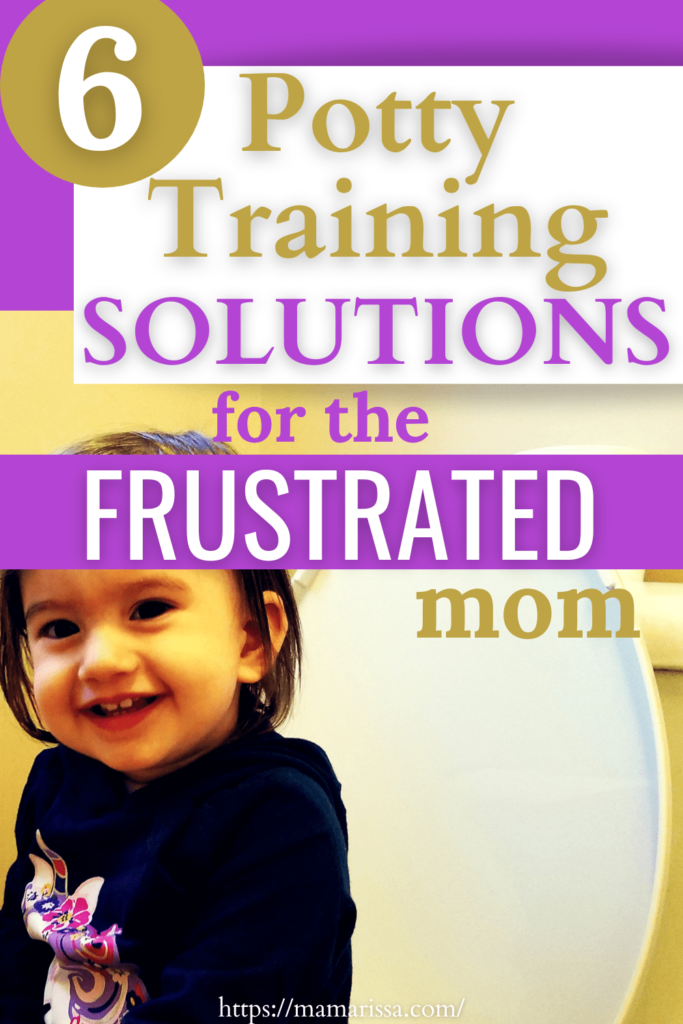
I then got this potty seat that sat on top of the toilet seat to make the opening smaller so that she would not fall in. This was great for letting her sit there unassisted … but I had to lift her onto it and off of it every time she needed to go potty.
Ultimately, I bought a step-up potty seat like this, which revolutionized going potty for my toddler! This was the ultimate and best decision I made on how to make going potty easier for her. With this, she was able to get onto and off of the potty completely by herself.
I will say that I did have to initially help her with getting up and down on this potty seat because she was nervous about it. But as she got used to it and learned how to turn herself around on it, it was perfect for our potty needs.
2. Inability to Wash Her Hands by Herself
The other problem we faced that hindered independence was our sink. Our bathroom vanity was so tall, she would not have been able to wash her hands independently for years!
We clearly needed a step-stool – a really tall one. But I was certain we would have many fall incidences that could be dangerous. So I began looking for a step-stool with guards on it like this to keep her from being able to fall off of it.
I ended up asking my dad to make one for us based off of the ones I found on Amazon. My dad does wood-working as a hobby, so I knew he could handle it. And he did!
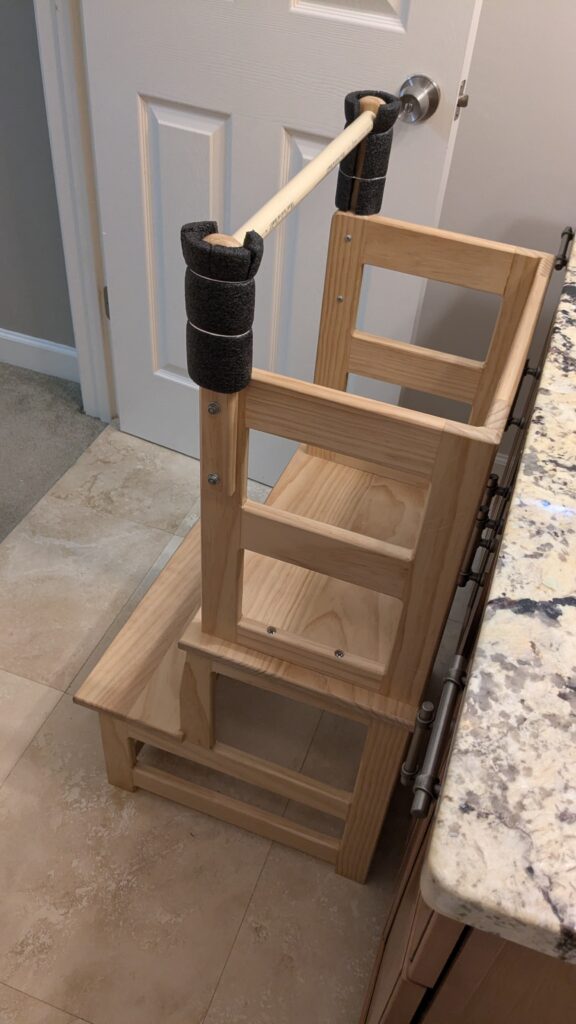
Having a step-stool that she could climb up onto herself without me worrying about her falling off of it was a HUGE help in growing her independence. Especially since I was pregnant at the time and lifting her up to wash her hands was getting challenging.
Read my complete molar pregnancy story here.
3. Forget About Having a Pinterest-Perfect Kid
If you have been scrolling through Pinterest looking for potty training tips and success stories and trying to come up with a game plan, you have probably come accross about two dozen posts by now written by mamas who say they have potty-trained their 15-month-old in three days.
I’m not saying this is impossible, nor am I trying to imply that they are lying about their own experiences. But just because it worked for that child does not in any way indicate that it will work for yours.
The ideas in some of these posts are great – I used some of their potty training tips myself. But set aside your expectation that your toddler will have the same amount of success in the same amount of time at the same age.
Pinterest will intimidate you with post titles like “Yes, You Can Potty Train an 18-Month-Old!” But you know what, Mama? “Can” and “have to” are very different things.
Don’t torture your child if you know she’s not ready. She will be ready in her own time. The real issue is, can you set aside your own mama competition to wait for your child to be ready?
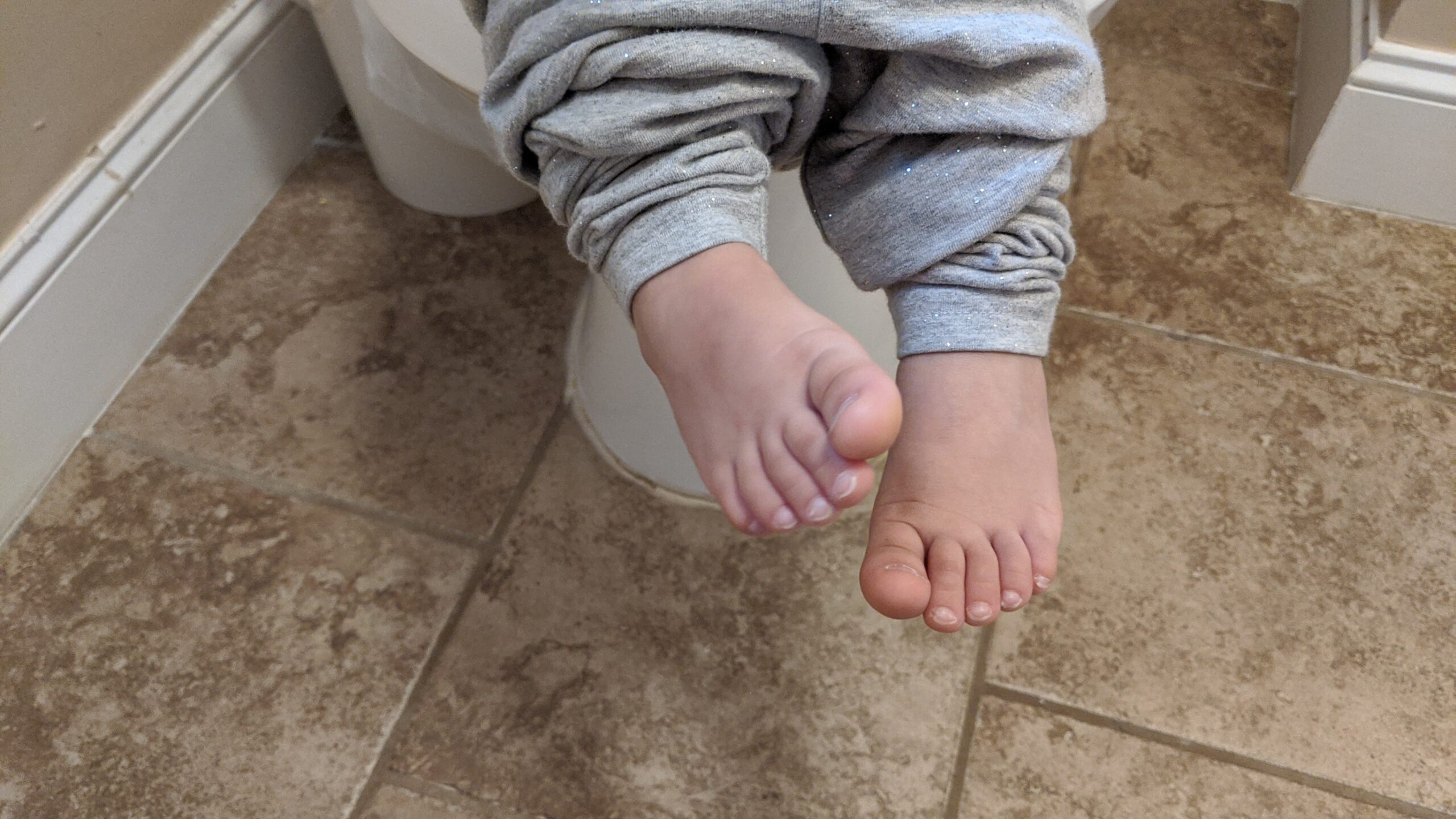
4. Take as Much Time as Your Child Needs
Speaking of time, let’s talk again about how long it takes to potty train a toddler. Despite the lofty claims of moms who have gone before you that their child was potty trained within a week, this is not the typical situation. Most of the moms I know complain that the process of potty training has been dragging on for what feels like forever.
I know how frustrating this is. As I mentioned, potty training was not a short journey with my daughter. It took us 6 months and I kept questioning whether she would ever fully catch on. It didn’t seem like it should be taking that long. But from what I’ve heard from other moms, this is not at all uncommon.
The longer I am a mom, the more I realize just how unique each child is. It is truly an amazing thing. But that means you can’t force another mom’s timeline on your own toddler when it comes to potty training – or anything else for that matter.
5. Expect Regressions and Road Bumps
Potty training, like any other milestone your child hits, may not be a linear process. There are good days and bad days, easy weeks and hard weeks. There are normal life things that come up and disrupt the progress your toddler is making (or remaining stagnant in, whatever the case may be).
If your child gets sick or you have to take a trip out of town, just assume that some progress may temporarily be lost in practice even if not in mentality.
For example, whenever my toddler’s reflux flared up badly, she would excessively pee her pants – so frequently that it became impossible to keep her clean. During these times, I had to give in and put her back in a diaper until the flare-up died down.
Check out these 15 signs your toddler still has acid reflux.
However, once her reflux was doing better and I put her back in panties, she still remembered what to do on the potty.
6. Stay Consistent Even When Your Child Does Not
While it’s imporatnt to stay flexible and be willing to work with wherever your child is at, try to stay consistant with your words if nothing else. Even when your little one is run down with illness, you can be bringing up the subject in an encouraging and non-threatening way.
If your toddler is just too fussy and irritable to deal with the trials of going potty, let him know you understand that practicing going potty like a big boy is too hard for him while he’s not feeling well. Explain that you are going to ease up until he’s feeling better and he can handle regular potty breaks again.
Dont just stop taking him potty and stop mentioning it altogether. It’s okay to take breaks but you can do it without just giving up. Keep up the potty talk even in the absense of potty activity.
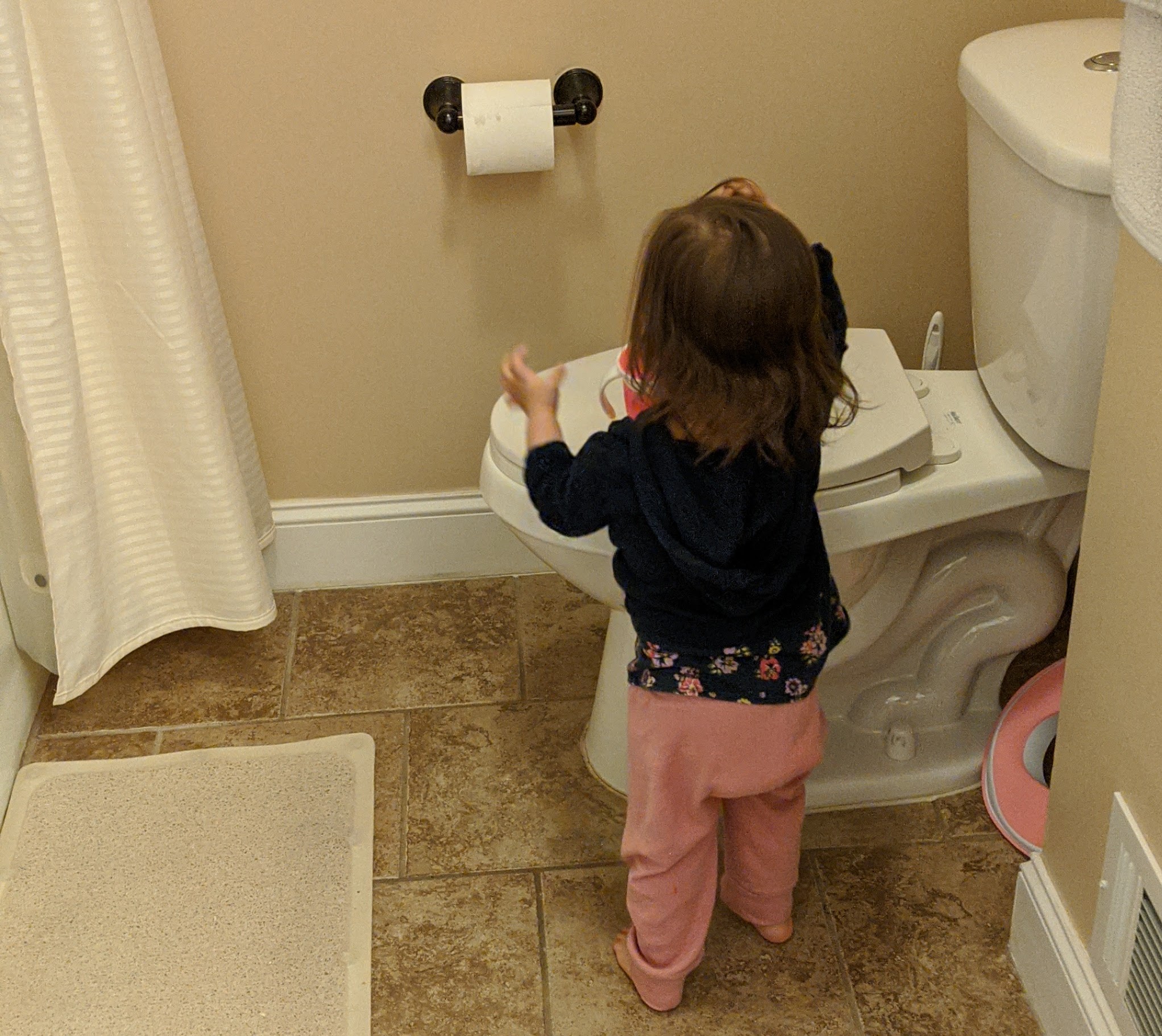
My Most Important Potty Training Tip
Above all, the most important thing you can do is not give up on potty training!
Now, to be clear, I’m not talking about pressuring a child who is clearly not ready to potty train. I’m talking about the discouragement of set-backs and halted progress.
I know it can get frustrating. I don’t know how many times I cleaned pee off of the floor, the rug, the couch, or the chair wondering why on earth my toddler would not tell me she needed to go potty even after peeing herself.
At times I questioned whether she needed a gentle consequence for peeing her pants – since the wet pants apparently were unimportant to her.
I began to make it a requirement that she help me clean up the pee, although this was more fun than anything for her given her love for cleaning (yes, I begot an unusual child who gets excited about picking up toys – but I’m not complaining!).
I sometimes wondered if I was being a little too gentle when reminding her to tell mommy she needed to go potty instead of peeing her pants. But in my heart, I knew she needed me to continue to be kind, gentle and patient and not forceful, threatening or punitive.
I now fully realize what I have sometimes doubted over the course of the past 6 months: She simply was not developmentally ready to be fully potty trained until now.
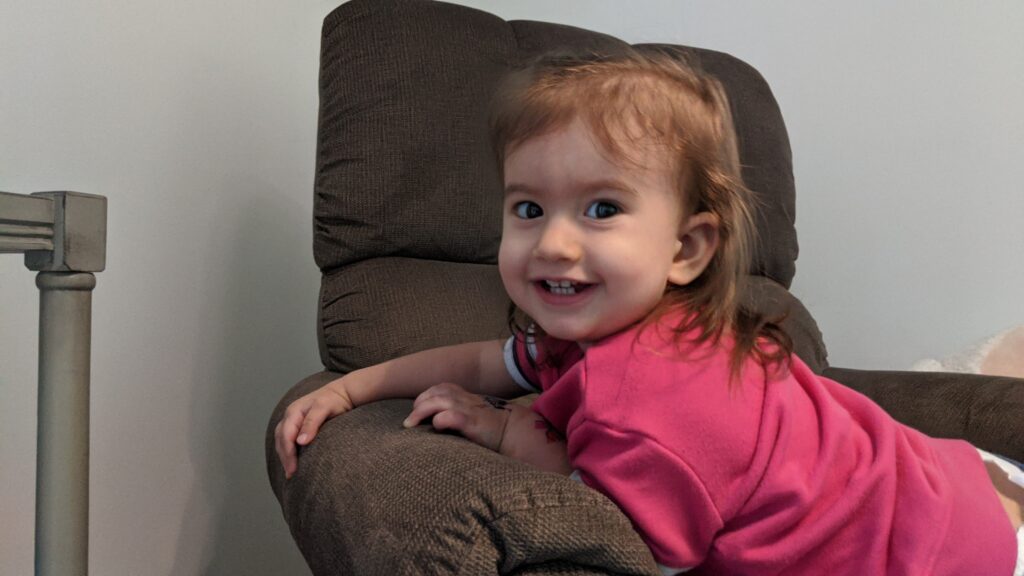
Why? I do not know. To me, it does not seem like a very big leap to go from knowing all the basics of how to go potty to stating that she needs to go potty, at least after saturating her pants if not before.
But for her unique, precious little self, it was a big leap. And now that she has made it, I could not be more proud of my big girl if she had potty trained herself at 12 months of age.
All that matters to this proud mama is that she did it. Not when or how or how long it took.
So don’t worry, frustrated Mama. Your little one will get there at the right time too. Keep up your patience and remember that this is a bigger skill for her to master than you probably realize.
Keep looking for potty training tips on Pinterest and keep trying new tactics if you want. But above all, focus on highlighting the successes instead of the accidents.
And if you just need to vent or share your potty training experience, please comment below. And then, don’t forget to share this post with other potty training mamas via the social share buttons below!
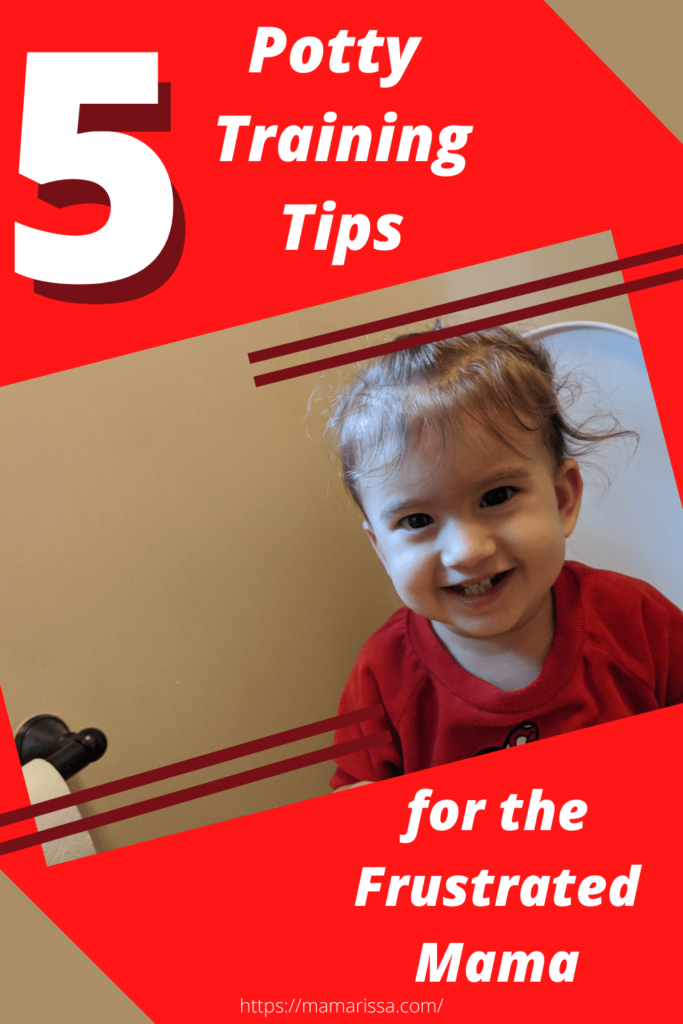

3 responses to “5 Potty Training Tips for the Frustrated Mama”
Thank u so much for this post. It really gives me some kind of hope! Even though my toddler just turned 3, and I am still training him… I just get some hope and release. He is very stubborn over all… and maybe I need to be more consistent , but it’s really frustrating because he does
Not care at all. Pio is actually way better than pee. He feels good when he poo in the toilet, but he also feels frustrated when I tell
Him he gotta do it in the toilet… so I guess it’s a matter of balance and
Patience!! A
Lot
Of
Patience
For my frustration is not blocking him . Thanks again!!Rocio,
I am glad you found some encouragement from this post. I know it can be really hard when the toddler and the parent have conflicting goals and priorities. But chances are, his priorities are not going to shift to line up with yours, so You may have to adjust your own goals a bit or find ways to make your goals more exciting for him (I know that can be easier said than done). Toddlers just want to do whatever is fun, so if you can somehow make it fun for him, he will probably do better. That might involve making it a little harder on yourself in some ways, but it might also be more effective.
For example, my daughter got to a stage where she did not want to go potty. But she would start to enjoy it if I sat with her and read her a book. This took some dedication from me, of course, but it did make going potty something she was willing to do.
I totally agree with you that balance and patience are essential parts of the potty training journey! I know it’s hard right now, but it WILL get easier and better over time.
[…] if you need more help with potty training, check out my second post on the topic, “5 Potty Training Tips for the Frustrated Mama“. I’ve also updated this post with an additional tip on how to encourage pottying […]
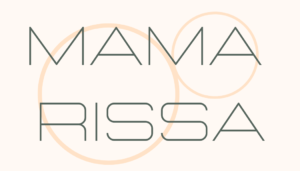



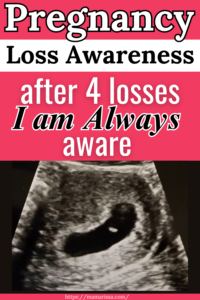





Leave a Reply